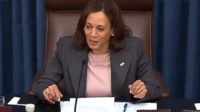Speculation is rising that political forces in Great Britain may thwart initial funding for the country's ambitious HS2 high-speed-rail program, now budgeted at more than $80 billion. The Labour Party's shadow chancellor, Ed Balls, questioned whether the money might be better spent on other projects. But U.K. Chief Treasury Secretary Danny Alexander told a civil engineers' transportation conference in London on Sept. 25 that the current government intended to push the project forward and that it was "absolute folly to neglect its long-term economic benefits for short-term political reasons."
The project would link northern England cities to London and to existing high-speed-rail lines in Scotland. The project's first phase, from London to Birmingham, is set for completion in 2026, with a second-stage extension to Manchester and Leeds to be finished by 2032. Alexander said the program would generate 40,000 jobs and have a $24-billion annual economic impact in the country.
 |
| ALEXANDER |
While acknowledging "the right of political parties to get different views," Alexander insisted the project could be delivered on time and possibly below budget with the U.K.'s "enormous project-management expertise." He told the 200 conferees that "it is our intention to get [the bill] well on its way in this Parliament. We are a government serious in investing in transport."
Separately, some skepticism may be tempered with the government's late September appointment of Sir David Higgins as HS2 chairman, effective in 2014. He is currently chief of the country's Network Rail program. Previously, he headed the U.K. Olympic Delivery Authority overseeing 2012 London Olympics facilities.
In media appearances, Higgins vowed to make the HS2 project "bipartisan," noting the huge amount of early skepticism over the Olympic building program, now considered a major success. Higgins termed the current rail network "an aging Victorian system" that is operating well beyond its design capacity. Alexander also said that, without more road investment, motorists "would spend 25% of their time in traffic jams in the next" 25 years.
Douglas Segars, head of infrastructure finance for national agency Infrastructure UK, said the country is eyeing more private finance for transportation, noting that it now makes up just 10% of project funding. He said private lenders "must be integrated into the business model" but also acknowledged that many sponsors "have left the market." Steven Hayter, chairman of the engineers' group team studying changes in U.K. transportation policies, noted that a new report has 57 key recommendations, including the creation of a national transportation "strategy" and giving more project budgeting authority to cities and regions. n





Post a comment to this article
Report Abusive Comment